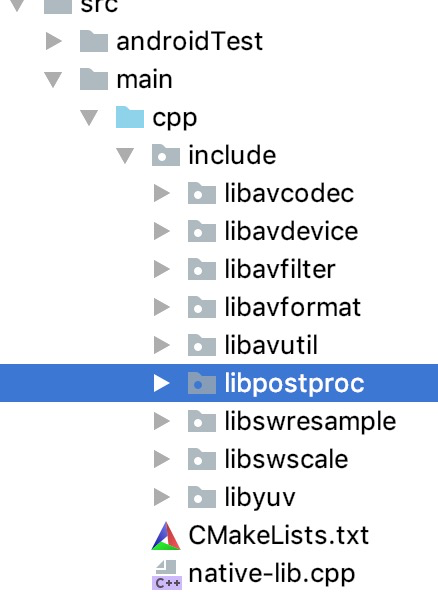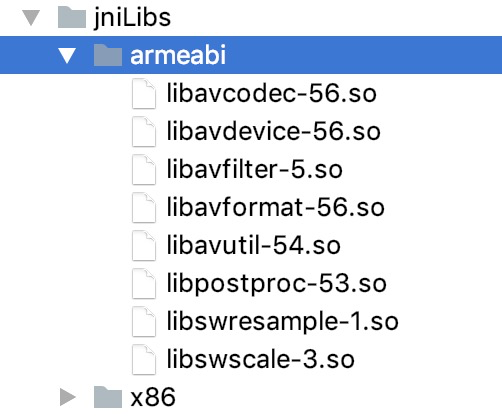1. Tool preparation
Computer Mac, development tool Android studio 3.4, compilation environment cmake
2. Development steps
- Create a new module project
- Create a new cpp folder and a new CMakeLists.txt file in the main directory
cmake_minimum_required(VERSION 3.4.1)
include_directories(../cpp/include)
set(SOURCES)
file(GLOB_RECURSE SOURCES ${CMAKE_SOURCE_DIR}/*.cpp ${CMAKE_SOURCE_DIR}/*.c)
# Import the log Library of the system
find_library( log-lib
log )
set(distribution_DIR ../../../../libs)
#add_library( yuv
# SHARED
# IMPORTED)
#set_target_properties( yuv
# PROPERTIES IMPORTED_LOCATION
# ${CMAKE_SOURCE_DIR}/../jniLibs/${ANDROID_ABI}/libyuv.so)
# Preload libfmod.so
add_library( avcodec-56
SHARED
IMPORTED)
set_target_properties( avcodec-56
PROPERTIES IMPORTED_LOCATION
${CMAKE_SOURCE_DIR}/../jniLibs/${ANDROID_ABI}/libavcodec-56.so)
# Preload libfmodL.so
add_library( avdevice-56
SHARED
IMPORTED)
set_target_properties( avdevice-56
PROPERTIES IMPORTED_LOCATION
${CMAKE_SOURCE_DIR}/../jniLibs/${ANDROID_ABI}/libavdevice-56.so)
add_library( avfilter-5
SHARED
IMPORTED)
set_target_properties( avfilter-5
PROPERTIES IMPORTED_LOCATION
${CMAKE_SOURCE_DIR}/../jniLibs/${ANDROID_ABI}/libavfilter-5.so)
add_library( avformat-56
SHARED
IMPORTED)
set_target_properties( avformat-56
PROPERTIES IMPORTED_LOCATION
${CMAKE_SOURCE_DIR}/../jniLibs/${ANDROID_ABI}/libavformat-56.so)
add_library( avutil-54
SHARED
IMPORTED)
set_target_properties( avutil-54
PROPERTIES IMPORTED_LOCATION
${CMAKE_SOURCE_DIR}/../jniLibs/${ANDROID_ABI}/libavutil-54.so)
add_library( postproc-53
SHARED
IMPORTED)
set_target_properties( postproc-53
PROPERTIES IMPORTED_LOCATION
${CMAKE_SOURCE_DIR}/../jniLibs/${ANDROID_ABI}/libpostproc-53.so)
add_library( swresample-1
SHARED
IMPORTED)
set_target_properties( swresample-1
PROPERTIES IMPORTED_LOCATION
${CMAKE_SOURCE_DIR}/../jniLibs/${ANDROID_ABI}/libswresample-1.so)
add_library( swscale-3
SHARED
IMPORTED)
set_target_properties( swscale-3
PROPERTIES IMPORTED_LOCATION
${CMAKE_SOURCE_DIR}/../jniLibs/${ANDROID_ABI}/libswscale-3.so)
#set(CMAKE_CXX_FLAGS "${CMAKE_CXX_FLAGS} -std=gnu++11"
add_library( # Sets the name of the library.
ffmpeg
# Sets the library as a shared library.
SHARED
# Provides a relative path to your source file(s).
${SOURCES})
target_link_libraries( ffmpeg
# yuv
avutil-54
swresample-1
avcodec-56
avformat-56
swscale-3
postproc-53
avfilter-5
avdevice-56
${log-lib} )- Add the native-lib.cpp file under the CPP directory
#include <jni.h>
#include <string>
#include <cstdlib>
#include <android/log.h>
using namespace std;
extern "C"//Because it is a mix of C and C + +, you must add
{
//Code
#include "libavcodec/avcodec.h"
//Package format processing
#include "libavformat/avformat.h"
//Pixel processing
#include "libswscale/swscale.h"
#include "libavutil/avutil.h"
#include "libavutil/frame.h"
}
#define LOGI(FORMAT, ...) __android_log_print(ANDROID_LOG_INFO,"jason",FORMAT,##__VA_ARGS__);
#define LOGE(FORMAT, ...) __android_log_print(ANDROID_LOG_ERROR,"jason",FORMAT,##__VA_ARGS__);
extern "C" JNIEXPORT jstring JNICALL
Java_com_lee_jniffmpeg_MainActivity_stringFromJNI(
JNIEnv *env,
jobject /* this */) {
string hello = "Hello from C++";
return env->NewStringUTF(hello.c_str());
}extern "C"
JNIEXPORT void JNICALL
Java_com_lee_jniffmpeg_VideoUtils_decode(JNIEnv *env, jclass clazz, jstring input_jstr,
jstring output_jstr) {
//Video files to be transcoded (input video files)
const char *input_cstr = env->GetStringUTFChars(input_jstr, nullptr);
const char *output_cstr = env->GetStringUTFChars(output_jstr, nullptr);
//1. Register all components
av_register_all();
//Encapsulate the format context, command the global structure, and save the relevant information of the video file encapsulation format
AVFormatContext *pFormatCtx = avformat_alloc_context();
//2. Open the input video file
if (avformat_open_input(&pFormatCtx, input_cstr, NULL, NULL) != 0) {
LOGE("%s", "Unable to open input video file");
return;
}
//3. Access to video file information
if (avformat_find_stream_info(pFormatCtx, NULL) < 0) {
LOGE("%s", "Unable to get video file information");
return;
}
//Get index location of video stream
//Traverse all types of streams (audio stream, video stream, subtitle stream) to find the video stream
int v_stream_idx = -1;
int i = 0;
//number of streams
for (; i < pFormatCtx->nb_streams; i++) {
//Type of flow
if (pFormatCtx->streams[i]->codec->codec_type == AVMEDIA_TYPE_VIDEO) {
v_stream_idx = i;
break;
}
}
if (v_stream_idx == -1) {
LOGE("%s", "Video stream not found\n");
return;
}
//Only when we know the encoding mode of video can we find the decoder according to the encoding mode
//Get the codec context in the video stream
AVCodecContext * pCodecCtx = pFormatCtx->streams[v_stream_idx]->codec;
//4. Find the corresponding decoding according to the encoding id in the encoding and decoding context
AVCodec *pCodec = avcodec_find_decoder(pCodecCtx->codec_id);
//(look at Xunlei. We can't find a decoder. Download a decoder temporarily.)
if (pCodec == NULL) {
LOGE("%s", "Decoder not found\n");
return;
}
//5. Turn on decoder
if (avcodec_open2(pCodecCtx, pCodec, NULL) < 0) {
LOGE("%s", "Decoder cannot be opened\n");
return;
}
//Output video information
LOGI("File format of video:%s", pFormatCtx->iformat->name);
int time=static_cast<int>(pFormatCtx->duration) / 1000000;
LOGI("Video duration:%d",time);
LOGI("Width and height of video:%d,%d", pCodecCtx->width, pCodecCtx->height);
LOGI("Name of decoder:%s", pCodec->name);
//Ready to read
//AVPacket is used to store frame by frame compressed data (H264)
//Buffer zone, open up space
AVPacket *packet = (AVPacket *) av_malloc(sizeof(AVPacket));
//AVFrame is used to store decoded pixel data (YUV)
//memory allocation
AVFrame *pFrame = av_frame_alloc();
//YUV420
AVFrame *pFrameYUV = av_frame_alloc();
//Only when the pixel format and picture size of AVFrame are specified can the memory be truly allocated
//Buffer allocation memory
uint8_t *out_buffer = (uint8_t *) av_malloc(
avpicture_get_size(AV_PIX_FMT_YUV420P, pCodecCtx->width, pCodecCtx->height));
//Initialize buffer
avpicture_fill((AVPicture *) pFrameYUV, out_buffer, AV_PIX_FMT_YUV420P, pCodecCtx->width,
pCodecCtx->height);
//Parameters for transcoding (scaling), width and height before and after transcoding, format, etc
struct SwsContext *sws_ctx = sws_getContext(pCodecCtx->width, pCodecCtx->height,
pCodecCtx->pix_fmt,
pCodecCtx->width, pCodecCtx->height,
AV_PIX_FMT_YUV420P,
SWS_BICUBIC, NULL, NULL, NULL);
int got_picture, ret;
FILE *fp_yuv = fopen(output_cstr, "wb+");
int frame_count = 0;
//6. Read compressed data frame by frame
while (av_read_frame(pFormatCtx, packet) >= 0) {
//As long as the video compressed data (according to the index position of the stream)
if (packet->stream_index == v_stream_idx) {
//7. Decode one frame of video compression data to get video pixel data
ret = avcodec_decode_video2(pCodecCtx, pFrame, &got_picture, packet);
if (ret < 0) {
LOGE("%s", "Decoding error");
return;
}
//Decoding completed for 0, decoding not 0
if (got_picture) {
//AVFrame to pixel format YUV420, width and height
//Input and output data
//3 7 the data size of input and output screen row by row AVFrame conversion is line by line conversion
//4 the first column of input data to be transcoded starts from 0
//5 height of input screen
sws_scale(sws_ctx, pFrame->data, pFrame->linesize, 0, pCodecCtx->height,
pFrameYUV->data, pFrameYUV->linesize);
//Export to YUV file
//AVFrame pixel frame write file
//Data decoded image pixel data (audio sampling data)
//Y brightness UV chroma (compressed) people are more sensitive to brightness
//The number of U V is 1 / 4 of Y
int y_size = pCodecCtx->width * pCodecCtx->height;
fwrite(pFrameYUV->data[0], 1, y_size, fp_yuv);
fwrite(pFrameYUV->data[1], 1, y_size / 4, fp_yuv);
fwrite(pFrameYUV->data[2], 1, y_size / 4, fp_yuv);
frame_count++;
LOGI("Decoding section%d frame", frame_count);
}
}
//Release resources
av_free_packet(packet);
}
fclose(fp_yuv);
env->ReleaseStringUTFChars(input_jstr, input_cstr);
env->ReleaseStringUTFChars(output_jstr, output_cstr);
av_frame_free(&pFrame);
avcodec_close(pCodecCtx);
avformat_free_context(pFormatCtx);
}- Modify the build.gradle file
apply plugin: 'com.android.application'
apply plugin: 'kotlin-android'
apply plugin: 'kotlin-android-extensions'
android {
compileSdkVersion 28
defaultConfig {
applicationId "com.lee.jniffmpeg"
minSdkVersion 15
targetSdkVersion 28
versionCode 1
versionName "1.0"
testInstrumentationRunner "android.support.test.runner.AndroidJUnitRunner"
externalNativeBuild {
cmake {
cppFlags "-frtti -fexceptions"
}
}
//ndk compilation generates. so file
ndk {
moduleName "ffmpeg" //Generated so name
abiFilters 'x86', 'x86_64', 'armeabi-v7a', 'arm64-v8a' //The output specifies the so Library under three abi architectures.
}
}
buildTypes {
release {
minifyEnabled false
proguardFiles getDefaultProguardFile('proguard-android-optimize.txt'), 'proguard-rules.pro'
}
}
externalNativeBuild {
cmake {
path file('src/main/cpp/CMakeLists.txt')
}
}
}
dependencies {
implementation fileTree(dir: 'libs', include: ['*.jar'])
implementation "org.jetbrains.kotlin:kotlin-stdlib-jdk7:$kotlin_version"
implementation 'com.android.support:appcompat-v7:28.0.0'
implementation 'com.android.support.constraint:constraint-layout:1.1.3'
testImplementation 'junit:junit:4.12'
androidTestImplementation 'com.android.support.test:runner:1.0.2'
androidTestImplementation 'com.android.support.test.espresso:espresso-core:3.0.2'
}
- Copy and paste the compiled files into cpp folder and jniLibs folder respectively, and start compiling after adding. Select Refresh Linked C++ Projects of build


- Writing native methods
public class VideoUtils {
public native static void decode(String input,String output);
static {
System.loadLibrary("ffmpeg");
}
}- End of operation

